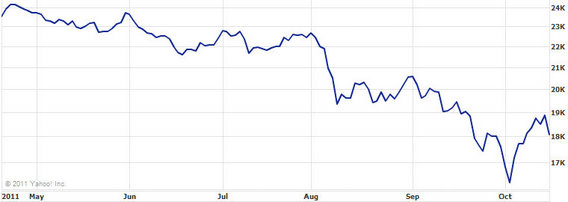
WHAT GOES UP must always come down.
So the saying goes. Luckily for investors, the opposite is almost always true.
So when Hong Kong’s current downturn hits bottom, where are things headed, and how fast?
A Chinese-language piece in the China Securities Journal broke down the current investing environment and offered insights into a possible new direction for the Hong Kong bourse.
Where the World Stands
Germany, and to a lesser degree France, have been the lynchpin EU member states in terms of keeping the political and economic union from crumbling before our very eyes.
The European Financial Stability Facility (EFSF), created in 2010 so safeguard financial stability in the region, would not be possible without the support of these two countries, and the scheme is continuing to provide a semblance of market normalcy in European bourses of late.
In addition, recent earnings from listed US lenders have generally come in ahead of expectations which is also helping boost sentiment – and valuations – on Wall Street.
The respite in the EU sovereign debt dangers has temporarily eased worries in markets, but sentiment still errs on the side of caution and the sound of popping champagne corks is definitely not to be heard.

Within this context, the A-share markets in Mainland China are still not satisfactorily stable and there is currently no clear guidance or policy pointing to a significantly brighter near term performance. This naturally impacts sentiment here in neighboring Hong Kong and presents continued challenges.
But it cannot be denied that there is a general consensus that the global financial markets may be turning a corner and heading back to more sustained growth.
Recent trending for the greenback and newfound stability in the EU’s ongoing debt crises both were taken as good news in New York, coupled with the better-than-expected raft of lender results and the perception that market risk is easing somewhat.
However, the continued softening of the US dollar does present challenges to assets denominated in that currency.
The US Federal Reserve said on Tuesday that its currency remains stable and global events are not overly eroding the value of the US dollar.
However, the recent moves by Germany and France to prop up financially struggling EU member states moves the region’s debt troubles a stop closer to resolution and therefore, by default, puts more downside pressure on the greenback.
But Spain’s continuous ratings downgrades are also acting as a counterbalance, and may help support the relative strength of the US dollar.
From a technical viewpoint, the US dollar should hold steady over the near term at around 0.765 euro, with consolidation likely around the 0.77 level should there fail to be a significant improvement in the EU debt crisis in the coming days.
Whither Hong Kong?
So where does all this leave Hong Kong’s capital market?

The reality is thus: The Special Administrative Region’s (SAR) stock market continues to be held hostage to financial and economic undulations overseas.
At the same time, shares in Hong Kong still struggle to shake off the doldrums affecting A-share listed firms in Mainland China – not only due to geographical proximity and market overlap, but also as some of Hong Kong’s biggest listed firms are not only PRC-based, but also dual listed on either side of the de facto border.
Under the lingering shadow of a moribund global financial climate, it is hard for investors here to shake off the negativity, and confusion comingled with pessimism is currently one of the overriding sentiments.
Therefore, despite the seeming temporary fix in the EU sovereign debt crises of member states like Greece, Italy, Spain and Portugal, Hong Kong investors are somewhat obsessed the developments in the EU – the world’s biggest economic region – and even recent moves by Germany and France to open their coffers for the good of the union are failing to bring many smiles in the SAR.
Nevertheless, no one can be accused of displaying Pollyanna-like characteristics for taking some cheer from the gradually improving situation in Europe.

The crisis does seem to be cooling off, albeit almost unnoticeably, so this should be put in the “positive” column.
But the rate of reform and visibility on what tomorrow will bring prevents many investors in Hong Kong from removing the EU from their mental checklist of worries.
Therefore, taking a technical viewpoint on the Hong Kong stock exchange, there is relatively strong near-term support for the bourse’s benchmark Hang Seng Index at the 18,000-point level.
Barring any additional financial setbacks on the global stage, this level could set the foundation for the next sustained rally.
But at the end of the day, more concrete steps to contain the debt contagion in the EU as well as better growth figures out of the US are needed to truly boost sentiment in Hong Kong.
See also:
Current Bear Market A 'Playground' For Institutional Investors
Counting The Costs Of Living In SHENZHEN
What Downturn? HK Millionaires Up 33%

